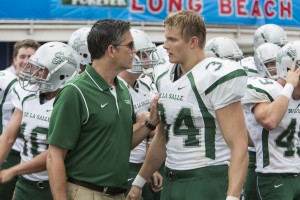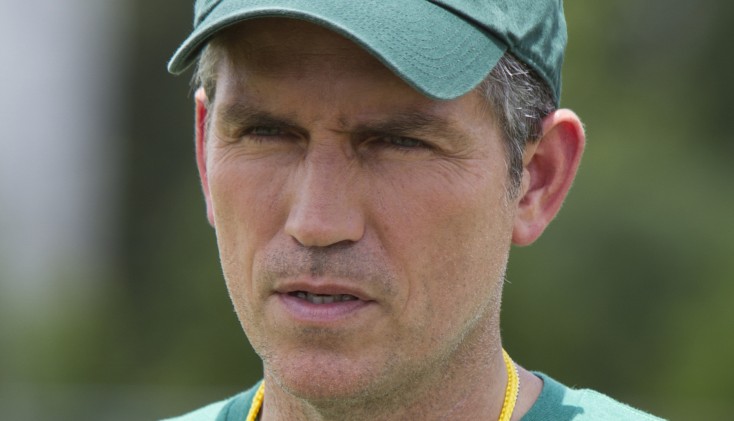
Jim Caviezel (left) and Alexander Ludwig in TriStar Pictures’ WHEN THE GAME STANDS TALL. ©CTMG. CR: Tracy Bennett.
By ANGELA DAWSON
Front Row Features
HOLLYWOOD—Jim Caviezel grew up in a household where participation in sports was expected. His father, James, had been a star UCLA basketball player coached by the legendary John Wooden. Tall and lanky, Caviezel hoped to follow in his father’s footsteps, earning a scholarship to Bellevue College in his home state of Washington. A foot injury during his second year ended his dream of an NBA career, though.
After the injury, Caviezel thought about joining the U.S. Naval Academy, but wasn’t accepted. That’s when the Mount Vernon, Wash., native decided to try his hand at acting. A fortuitous meeting with his screen idol Jimmy Stewart happened at an event honoring then President Ronald Reagan. Caviezel, then 21, was working at as a waiter and got some sound advice from the veteran actor.
“Young man, whatever you do, make good movies,” he recalls Stewart telling him. “So that’s what I’ve tried to do.”
Best known for his role as Jesus in Mel Gibson’s controversial “The Passion of the Christ,” Caviezel has accepted roles guided by his principles and his faith. (He is a devout Catholic, who has eschewed roles that conflict with his beliefs.)
The 45-year-old currently stars alongside “Lost” star Michael Emerson in the hit CBS crime drama series “Person of Interest.” The fourth season of the series, in which he plays a former FBI agent recruited by a mysterious billionaire (Emerson) to prevent violent crimes, is set to premiere September 23.
Having once depicted golf legend Bobby Jones, Caviezel now plays a high school football coach, whose unique approach with his players helped lead the Northern California team to an unprecedented 151 consecutive victories, as well as 12 straight State Championships in the 1990s and the early 2000s. The drama is not about the team’s incredible winning record, though, but how Bob Ladouceur’s taught his players to cope and persevere after a tragedy led to the end of “the streak.” The drama, directed by Thomas Carter (“Coach Carter”), is based on Scott Marshall Smith’s screenplay adapted from reporter Neil Hayes’ nonfiction book, “When the Game Stands Tall: The Story of the De La Salle Spartans and Football’s Longest Winning Streak.”
The soft-spoken actor, who responds to questions deliberately and thoughtfully, said during a recent interview that he was pleased when he got the script and discovered it was more than just another underdogs-become-winners sports movie. He says he was honored to play a man (who still coaches the De La Salle High School Spartans along with his assistant coach Terry Eidson, depicted onscreen by “The Shield’s” Michael Chiklis), who instills core values in his players that go beyond the game.
Q: What did you learn from your initial meeting with Coach Bob Ladouceur?
Caviezel: I was at his 399th victory and I got to film him at half time and during the game. I got to see how he really works. He’s just quite an extraordinary coach and very selfless. It really isn’t about him. A lot of coaches will say, “It’s not about me,” but it is really about them. (He laughs.) But Bob is not there to discuss himself. He’s just quite extraordinary. I talked to (sports commentator and former coach) John Madden, and he said to me, “This guy could have coached anywhere. He could be making a high seven-figure salary, but he couldn’t give a crap about any of that stuff.”
Q: Have you seen Coach Lad (as he’s called) since you made the film?
Caviezel: We met briefly after (shooting the movie). He said, “Doing this media stuff, Jim, I never wanted any of this.” He really didn’t.
Q: What convinced you take the role?
Caviezel: When I heard about the script, I thought it was going to be like (the typical sports movie), but then I read it and those concerns were dealt with the first thing in the movie. I wondered, “Where is this movie going to go?” In fact, when they sell it, I got a call from one of my best friends who said to me, “Gee, I don’t need to see your movie; I just saw the trailer. I think they gave away too much.” And I said, “I really think you need to see the movie,” and so he saw it, and then said to me, “Oh wow, now I get why they gave all that away (in the movie trailer).”
Q: The coach wanted the kids to set personal goals for themselves but he also expected them to rely on each other to meet those goals.
Caviezel: Yeah, there’s a part in the book where Coach Lad walks in—and I wish they would have put it in the movie—and he says, “Part of growing up is having a situation arise and you have to figure it out.” He basically said, “Deal with it. Figure it out,” and then he walked out. All of the players were left in the locker room to step up. I just think that was a great part of the book.
Q: What impressed you about Coach Lad when you met him?
Caviezel: One of the things I can tell you is right from the get-go; I was transfixed on how those boys looked at him. I saw myself not as Coach Lad but as those boys. That was the journey on how to play this guy. I know the story because I was a player of how I wanted to be treated as a young man and what was expected of me. My dad had played for (coach) John Wooden at UCLA. I knew Coach Wooden until he died. He’d come over and he was like my grandfather. My dad taught me so many things as did Coach Wooden as well. I watched him and was connected to him through my entire life. His philosophy was a lot like Coach Lad’s and Coach Lad’s is a lot like his. I always wondered why more coaches don’t have that. I think it comes down to the fact that there are guys out there that want to score 40 points and would rather lose, so the attention’s on them instead of the team. Instead of scoring two points and winning the game. That ego is a killer. When it’s not about the personal growth, they can talk what they want, but they don’t live it. He lives it. He’s authentic.
Q: Do you think it’s a good idea to create expectations for youngsters?
Caviezel: You see a lot of apathy now. I remember when my dad said to me, “Here, you’re going to go to basketball camp this summer, which is a great privilege or you can work the fields and bale hay. But you’re going to do something.” It was backbreaking work. And he said, “That’s why you’re going to go to college.” He told me I was lucky. Thank God for him because I never would have survived in this industry. He was my father but he also tough with me. He had really high expectations of me. He believed I was going to do it and if I didn’t get it done, he made sure I did. There was punishment involved with it, like getting grounded, and not getting to do the things I wanted to do, and sometimes I got a swat on the ***. (He chuckles.)
Q: How did this work with your schedule on “Person of Interest?”
Caviezel: It was very difficult. But I went out and did it. I said yes to the movie in September and October and met with Coach Lad during his last game, the state final. I videotaped it and watched it. Every day, I watched the movie and looking at things.
Q: Did you take the role partially because it is a faith-based film?
Caviezel: No, I took it because it was a great story. Does it have faith elements in it? Yes. But, at the end of the day, so did “To Kill a Mockingbird,” “Ben-Hur” and “Braveheart.” I’m looking for stories that are moving to me that have some sort of redeemable quality to them.
Q: Are they difficult to find?
Caviezel: Yes, of course they are. It’s different. You’re raising a different kind of kid now because you’re teaching them a different way. This guy is still teaching things that are timeless. Films and TV programs that in my guestimation are going to last and stand the test of time, including shows like (co-star Chiklis’) “The Shield,” are things that hit you at your core, hit your heart, go past your brain. I may not understand it, cerebrally, but when I see it a decade later, it still holds up. It’s those human characteristics and relationships that I like. In this one, the message is love. Sometimes the love is tough. Sometimes you hear things that you don’t want to hear, but you ought to hear them.





